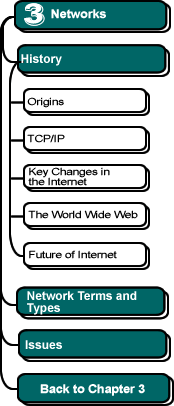

|
IP addresses: In short supply!
There is a problem with all of this: Even though the traditional 32-bit (four-byte) IP address scheme consisting of four numbers (each between 0 and 255) offers 256 x 256 x 256 x 256 = 4,294,967,296 possible IP addresses (more, really, since there are certain "tricks" possible), this is not enough for today's Internet!
Thus, a new scheme for IP addresses is being introduced: IPv6. This is a 128-bit (16-byte) address scheme. At face value, this would seem to provide 25616 possibilities: 340,282,366,920,938,463,463,374,607,431,768,211,456 combinations. However, again, given the clever addressing "tricks" that are part of this scheme, many more computers than this can be assigned IP addresses.
 How
big of a number is this? One person has noted that IPv6 would make it
possible to assign an IP address to every molecule on the planet!
How
big of a number is this? One person has noted that IPv6 would make it
possible to assign an IP address to every molecule on the planet!
![]()
![]()
This chapter was written by Jeff Nyhoff and Joel Adams. Copy editing by
Nancy Zylstra
©2005 Calvin University (formerly Calvin College), All Rights Reserved
If you encounter technical errors, contact computing@calvin.edu.